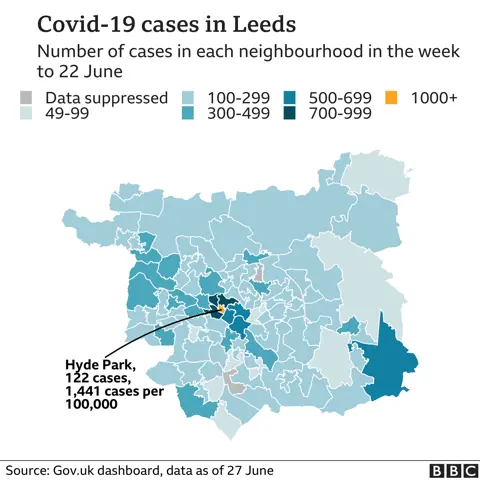Self-isolating students in end-of-tenancy 'nightmare'
 Munashe Ngwenya
Munashe Ngwenya Pots, pans and priceless memories. Just some of the things university students take with them when they move out of their house shares each summer.
But Leeds Beckett University student Munashe Ngwenya and his housemates are going nowhere when their tenancy ends this week.
Munashe, 19, tells Radio 1 Newsbeat his housemate tested positive for Covid-19, so they've got no choice but to self-isolate for 10 days.
"It's put a spanner in the works," Munashe says.
His landlord has said that he's able to stay for as long as he needs to isolate, but that he'll have to pay for each day extra that he's there.
"It's understandable because they do need to give this room to other people and I shouldn't be here, but at the same time I couldn't really do anything about it," he says.
"As a student, I'm broke as it is."
Leeds Beckett says its accommodation team will support any students in Munashe's position.
'We had to move or we'd be homeless'
Parts of Leeds, which is home to five universities, have Covid infection rates above the national average, with a significant rise in cases in recent weeks.
So Munashe isn't the only one being told to self-isolate past the end of his tenancy - but not everyone's making the same decisions.
Kelly, whose name we've changed, lives with three people, and when she tested positive for Covid-19, everyone in the house was legally obliged to self-isolate.
But with their tenancy agreement coming to an end, it made things tricky and they decided to break the rules to move back home.
"We didn't really have a choice in the matter. I've seen other students have to pay for the days they were in isolation, which for us would have been a dream," Kelly's housemate Kieran (not his real name) tells Newsbeat.
The friends say the landlord was going to charge a month's rent, a 30-day cancellation notice fee and the upkeep of the next tenants - which would have cost thousands.
"It was no fault of our own, we had no choice but to move home otherwise we'd be homeless. We can't pay that amount of money."
The UK government website says "landlords should avoid moving tenants who are showing symptoms of coronavirus or self-isolating".
But this is merely guidance, not law.
Student housing charity Unipol says tenants should stick to self-isolation rules, and advises contacting the landlord as soon as possible if self-isolation is going to impact their move-out date.
Kieran says after calling 119 for help, he was advised he would be able to travel to a new destination if he was to become homeless at any point during isolation.
He's aware his decision to move out, instead of isolate, could mean he's passed the virus on.
"But I wouldn't feel responsible for that, because I didn't test positive for Covid and I refuse to accept responsibility for something out of my control."


Kelly feels the whole situation "has been a nightmare".
"We only needed four more days on the tenancy, it's so annoying and has caused mayhem. When you don't have an option, you have to accept the risk."
Kieran adds Covid rules have been there to protect people, but that the government should have put measures in place to protect students.
"They should have known there was going to be a surge in cases when tenancy ends so there should have been something done to protect students."
A government spokeswoman told Newsbeat students who are required to self-isolate "should seek to delay their move with support from their university".
"We strongly urge accommodation providers and private landlords to come to amicable agreements with students, and to change move dates to ensure students are able to complete their self-isolation periods."
She said the government has provided £85m of hardship funding for students most in need of support, including those facing additional accommodation costs due to Covid.

Analysis
By Rob England, BBC England Data Unit
Cases are rising across the board in England, but the neighbourhoods where this is happening are predominantly student areas in cities like Leeds, Manchester, Newcastle and Birmingham.
Overall, people aged 20-24 are seeing the highest proportion of cases.
This isn't necessarily surprising. It's the summer, bars and pubs are open and younger people haven't had access to the vaccine for very long - so won't yet be benefitting from its protection as they socialise.
In some ways cases among younger people are less concerning, as these groups are less likely to become seriously ill from coronavirus.
However any rise in infections risks working its way through to unvaccinated older populations, who are far more at risk of serious illness, particularly from the Delta variant of the virus.
It's likely health officials will be pinning their hopes on initiatives like the "grab a jab" weekend to plug the gaps in vaccine coverage, putting the brakes on this latest wave and any additional pressure it heaps on the NHS.


